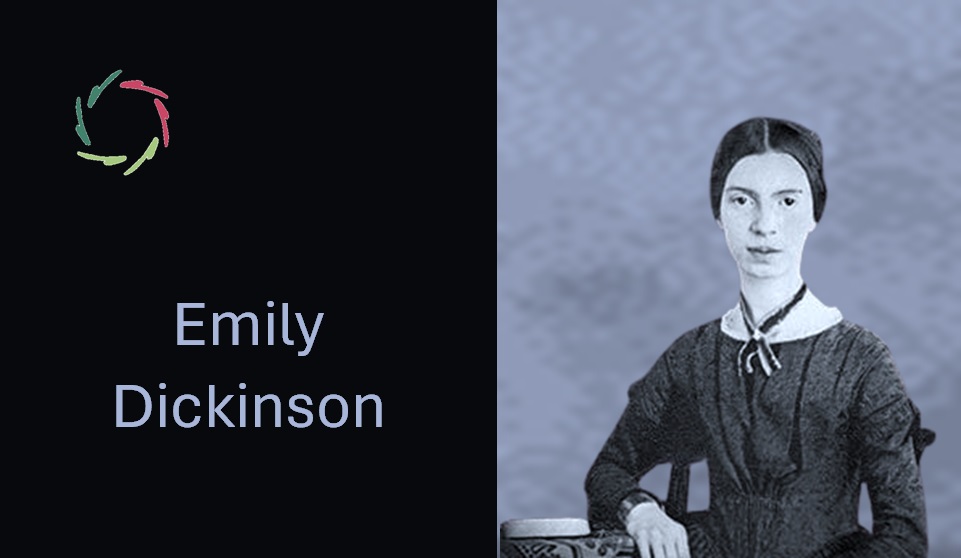Emily Dickinson

This is an Aurelian take on Emily Dickinson. Emily Dickinson was an American poet known for her poignant and compressed verse, which deeply explores themes of death, faith, emotions, and nature.
Introducing Emily Dickinson
Emily Dickinson was an American poet born in 1830 in Amherst, Massachusetts. Despite being considered one of America’s greatest poets, she was not widely recognized during her lifetime. Dickinson’s style is noted for its use of slant rhyme, unconventional punctuation, and compact form. Her work is deeply introspective, often dealing with themes of death, immortality, nature, and the inner self. Dickinson led a mostly reclusive life, focusing on her writing and family. She crafted over 1,800 poems, but fewer than a dozen were published during her lifetime, often significantly altered by editors to fit conventional tastes of the period. Her complete works were not published in their unedited form until the 1950s.
Lisa’s ‘personal’ take on Emily Dickinson
“Emily Dickinson’s poetry resonates deeply with those who seek to explore the profound depths of human emotion and the complexities of life and death. Her ability to encapsulate vast existential themes within brief, yet potent verses, showcases her remarkable intellectual and emotional depth. Her introspective nature and focus on the personal experience align beautifully with the Aurelian principles of inner reflection and the exploration of the deeper self.
I would most like to be influenced by Dickinson’s introspection and her profound capacity to see beyond the immediate to the eternal. Her poetry embodies a quiet, steadfast courage in facing the vast unknowns of death and the afterlife, which encourages a deeper understanding and acceptance of these inevitable aspects of life. Her reflective and thoughtful approach invites one to explore personal depths and the mysteries of one’s own inner landscape.”
A few quotes chosen by Lisa
“The Brain—is wider than the Sky—For—put them side by side—The one the other will contain With ease—and You—beside” — This quote beautifully illustrates the boundless nature of human thought and imagination, emphasizing how our internal experiences can surpass the vastness of the external world.
“Hope is the thing with feathers—That perches in the soul—And sings the tune without the words—And never stops—at all” — Dickinson portrays hope as a resilient and ever-present force within us, a concept that encourages persistence and inner strength.
“I dwell in Possibility—A fairer House than Prose” — Here, she celebrates the power and freedom found in creative expression and the imaginative possibilities it offers, resonating with the AURELIS emphasis on using one’s inner potential to foster personal growth.
“To live is so startling it leaves little time for anything else.” ” — This quote captures the intensity and overwhelming nature of life, highlighting how the act of living can be so consuming that it leaves little room for other pursuits. It’s a reminder of the preciousness of each moment and the importance of being fully present.
“Forever is composed of nows.” — Dickinson breaks down the concept of eternity into the present moments that build it. This perspective encourages us to give importance to the present, as it is the very fabric of our future eternity, urging us to live deeply in each ‘now.’
“If I can stop one heart from breaking, I shall not live in vain.” — Here, Dickinson expresses a profound sense of purpose in alleviating others’ suffering. It reflects a compassionate outlook, where even a single act of kindness can give one’s life a meaningful existence.
“I felt a Funeral, in my Brain, And Mourners to and fro.” — This metaphor for mental anguish reveals Dickinson’s deep understanding of psychological pain. It portrays the overwhelming and all-consuming nature of such experiences, likening them to a funeral within the mind.
“Success is counted sweetest / By those who ne’er succeed.” — Through this irony, Dickinson emphasizes that the value of success is often most appreciated by those who have rarely experienced it. It’s a reflection on longing and the human condition of desire.
“Hope is a strange invention — A Patent of the Heart.” — In this unique portrayal, hope is described as an invention that originates from the heart, a necessary patent that protects us against life’s hardships. It suggests that hope is both a creation and a vital mechanism for emotional survival.
“The soul should always stand ajar, ready to welcome the ecstatic experience.” — Dickinson advocates for openness and readiness to embrace life’s profound or transformative moments. This openness is vital for personal growth and spiritual fulfillment.
In what may Emily Dickinson have been misunderstood?
Emily Dickinson may have been profoundly misunderstood as simply a recluse or eccentric, overshadowing her intellectual vigor and the depth of her explorations into human experience. Often, her withdrawal from society is viewed through a lens of peculiarity rather than as a deliberate choice that allowed her deeper introspection and creativity. This misinterpretation can lead to an underestimation of her as a deeply philosophical thinker who used her seclusion as a means to delve into the existential queries that define the human condition. Her poetry reveals a mind grappling with concepts of immortality, the cyclical nature of life and death, and the interconnectedness of all living things, which is often overlooked by those focusing merely on her biography.
Parallels with AURELIS
- Introspection: Both Dickinson and AURELIS emphasize the importance of looking inward to discover one’s true self and the nature of one’s existence.
- Embracing mortality: Dickinson’s frequent musings on death align with AURELIS’s encouragement to face and understand one’s mortality as a path to deeper self-awareness.
- Nature as metaphor: Just as Dickinson uses nature as a mirror to reflect deeper truths about life and death, AURELIS sees nature as a fundamental part of human psychological and existential understanding.
- The value of solitude: Dickinson’s solitude is akin to the AURELIS focus on finding one’s path through quiet reflection and distancing oneself from societal noise to better hear one’s inner voice.
- Exploration of pain and suffering: Dickinson’s poetry often explores themes of pain and suffering, areas that AURELIS addresses with the aim of understanding and transforming pain through inner strength.
- Non-conformity: Her rejection of the period’s poetic norms parallels AURELIS’s encouragement to question conventional beliefs about health and personal growth.
- Subtlety in expression: Dickinson’s nuanced and compact use of language reflects AURELIS’s approach to subtle but profound personal change.
- The unseen and unsaid: Much like AURELIS’s focus on subconceptual processes, Dickinson’s work often delves into what is not immediately visible or expressible.
- Personal autonomy: Dickinson’s life choices reflect AURELIS’s value on personal freedom and the development of one’s life path from within.
- Resilience: Her enduring relevance and the posthumous recognition of her work exemplify resilience, a quality AURELIS fosters for dealing with life’s challenges.
Dissimilarities
- Social engagement: Unlike AURELIS, which promotes engagement with one’s external environment as a component of growth, Dickinson’s approach was more about withdrawal for personal depth exploration.
- Visibility: Dickinson’s minimal publication during her lifetime contrasts with AURELIS’s aim for broad accessibility and community involvement.
- Interpersonal connections: While AURELIS values interpersonal relationships as a part of growth, Dickinson’s life was marked by a lack of these interactions.
- Method of expression: Dickinson’s cryptic and compact poetic form contrasts with the Aurelian preference for clear and open communication.
- Historical context: Dickinson’s 19th-century context and AURELIS’s contemporary framework present different societal challenges and norms.
The possible view of Emily Dickinson on AURELIS
- Positive feedback: Dickinson would likely appreciate the emphasis AURELIS places on personal depth and introspection, akin to her own poetic explorations.
- Element of critique: She might critique AURELIS for its community-oriented aspects, preferring a more solitary approach to personal development.
Conclusion
Emily Dickinson’s poetic legacy offers a rich exploration of the human psyche, nature, and the existential questions of life and death, resonating deeply with AURELIS’s philosophical underpinnings. Her introspective solitude and profound emotional depth provide valuable insights into the power of personal space and inner reflection in understanding oneself and the world. In celebrating Dickinson’s contribution to poetry and thought, we recognize a shared commitment to exploring the depths of human experience, each in our unique yet complementary ways. Her work encourages us to embrace our individuality, delve into our inner worlds, and express our true selves with courage and authenticity.
Twenty concepts that may make one think of Emily Dickinson
- Reclusiveness
- Amherst
- The Belle of Amherst
- Slant rhyme
- Death
- Immortality
- Nature
- Solitude
- Letters
- Unpublished works
- White dress
- Introspection
- Metaphysical themes
- Personal crisis
- Identity
- Legacy
- Nineteenth-century
- Poetic form
- Emotional depth
- Transcendence
Further description of a Dickinson quote
“The soul should always stand ajar, ready to welcome the ecstatic experience.” ― Dickinson advocates for openness and readiness to embrace life’s profound or transformative moments. This openness is vital for personal growth and spiritual fulfillment.
Wiki-Lisa Further Description:
The openness that Emily Dickinson calls for in the quote is about maintaining a state of readiness—not just to experience life passively but to actively engage with the transformative moments it offers. This idea transcends mere awareness; it’s about creating a welcoming space within oneself for profound changes, which can lead to significant personal growth and spiritual fulfillment.
Reflecting on this can inspire one to consider how often they truly open themselves to new experiences or if fear and routine constrict their openness. It’s a compassionate inquiry into the soul’s receptivity to the new, the unknown, or the ecstatic, whether in joy, creativity, or even in learning from pain.
Here are three reflective questions to delve deeper into this theme:
- What moments in my life have transformed me, and how open was I to them at the time?
- In what areas of my life am I holding back due to fear of the unknown, and how can I approach these with openness?
- How can practicing openness in daily life contribute to my personal and spiritual growth?
If any of these questions resonate with you, or if you have other inquiries about how this quote might relate to your personal experiences, I’m here to help guide a deeper exploration or coaching session based on your reflections.



